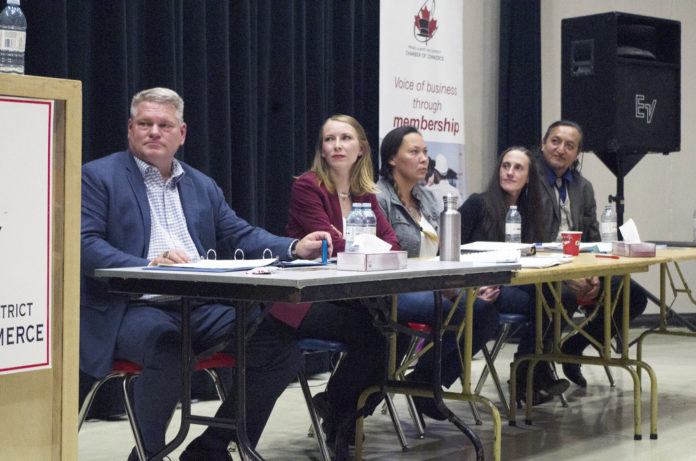
Political coalitions and minority governments have dominated national discussion as Canada’s 43rd federal election campaign approaches the finish line, but that’s not the case in Prince Albert.
Polling numbers released on Tuesday by the non-profit Angus Reid institute show the Conservatives with a slight lead over the Liberals nationally, leading to speculation about potential coalitions. However, local candidates from the country’s three largest parties say the issue isn’t really on their radar.
“I haven’t thought about what we’re going to do if we win a minority because I’m hoping we’re going to win a majority,” Conservative candidate and incumbent MP Randy Hoback said when asked about possible coalitions.
“I’m just focused on my election in this riding,” Liberal candidate Estelle Hjertaas explained. “I think that when the (national) election results come down then everyone needs to consider all options and determine what (to do next).”
“I think there should be a majority government for the NDP,” said Harmony Johnson-Harder, the NDP candidate for Prince Albert. “We’re in it to win it.”
Speculation started when reporters asked NDP leader Jagmeet Singh about possible coalitions during a campaign stop in British Columbia on Sunday. At the time, Singh said the NDP would “absolutely” consider entering a coalition with the Liberal government. He also ruled out any NDP support for a Conservative minority government, echoing a similar pledge he made in August.
When asked about those comments a day later, Singh told reporters he was focused on getting NDP candidates elected, and not on negotiating a coalition.
Johnson-Harder backed the NDP leader’s comments on Thursday. She said the NDP wouldn’t support the Conservatives because of their spending cuts, but otherwise remained uncommitted.
“In the case of a minority government, the NDP are going to push forward our platform,” she explained. “We’ll hold the balance of power and we will fight for the things that we believe in, such as Pharmacare, extending the universal healthcare to include mental and dental health, climate change action and just holding the government accountable to the things that they promised.”
Conservative Party leader Andrew Scheer used Singh’s remarks as a chance to criticize any NDP-Liberal partnership, claiming that a vote for the NDP was a vote for the Liberals.
Conservative candidate Randy Hoback also backed his leader’s remarks, saying Singh’s comments show the NDP is out of touch with Saskatchewan voters.
“When he comes out and says that he’s only going to deal with the Liberals, it just proves that only one person can defeat Justin Trudeau and that’s Andrew Scheer,” Hoback said. “Any vote for the NDP is a vote for the Liberals.”
Liberal leader Justin Trudeau also said he’s focused on governing, not deal making. During an Oct. 13 campaign rally the Ontario riding of Newmarket-Aurora, Trudeau said Canada needs a progressive government, not a progressive opposition, and reiterated that only the Liberals could stop Scheer’s Conservatives.
In Prince Albert, Liberal candidate Estelle Hjertaas said she hasn’t had any questions from voters about what the Liberals would do in a minority government situation. She added that it was best to avoid making any commitments before the final results are in.
“I think the choice in the end is whether we have a Conservative government led by Andrew Scheer or a Liberal government led by Justin Trudeau,” she said. “I think that’s the big choice. If there is no majority government (then) I think everyone should consider all the options that exist…. I don’t think people should close off their options before they know what the results are.”
Conservatives take slight dip, Liberals stall: Angus Reid
The Conservatives took a slight hit in the latest polling numbers released on Oct. 15, dropping one percentage point from where they were on Oct. 10.
Angus Reid’s latest polls shows 33 per cent of respondents are committed or leaning towards voting Conservative, a four per cent lead over the Liberals, who remain unchanged at 29 per cent. The NDP was the only party to see a significant rise in support. They gained two percentage points, and now sit at 19 per cent heading into the final weekend of campaigning.
Angus Reid polling shows most of the electorate already decided who to vote for. Roughly 52 per cent of respondents said they are “absolutely certain” about who they will vote for, with another 33 per cent saying they are “fairly certain.” Only five per cent say they are “not certain at all.”

